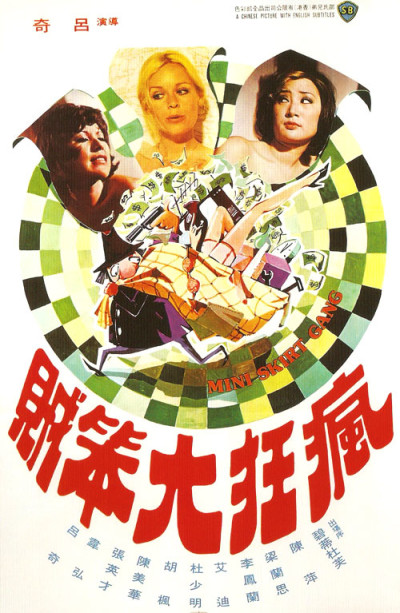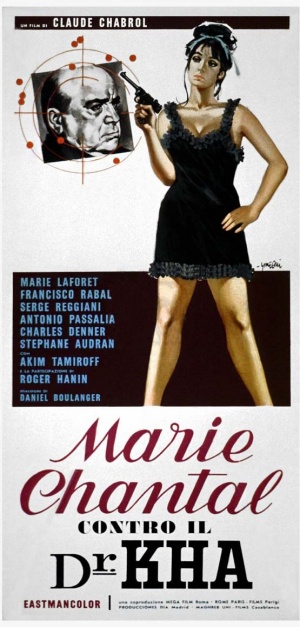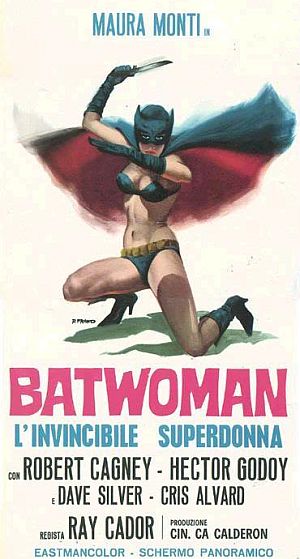★★½
“She spits on your grave.”
 I’m still in two minds as to whether the ending here is utter genius, or the worst cop-out since the entire seventh series of Dallas turned out to be a dream. You could argue a case for either, and I could see your point. On the one hand, there’s a case it renders the previous 80 minutes irrelevant. On the other, it’s also a mindbending twist, which deserves points for sheer audacity, and going to that well, not once but twice. However, the main problem is a central character who is a good deal less interesting than the femme fatale after whom the film is named.
I’m still in two minds as to whether the ending here is utter genius, or the worst cop-out since the entire seventh series of Dallas turned out to be a dream. You could argue a case for either, and I could see your point. On the one hand, there’s a case it renders the previous 80 minutes irrelevant. On the other, it’s also a mindbending twist, which deserves points for sheer audacity, and going to that well, not once but twice. However, the main problem is a central character who is a good deal less interesting than the femme fatale after whom the film is named.
Reagan (Wiles) heads to Vegas after his pal Double (C. Thomas Howell) sends him a pic of the titular hot chick, and tells him she is keen to hook up. On arrival, Reagan doesn’t find his friend; however, he does find Monika (Vincent), and a night of drinking, dancing and making the double-backed armadillo follows. The next morning, she’s gone, and when Reagan meets Double, he’s in for a shock, because he learns that Monika had, apparently, been gunned down the night before. She was the victim of Terry Joe (Branson), a local drug dealer from whom she had stolen a large sum of money, putting him in deep trouble with his boss, Eli (Howard). So, what the hell is going on here? We know that Reagan claims to have “visions,” which sometimes can be premonitions of future events? Is that what he’s seeing? Or is there an alternative explanation, which may or may not be more prosaic?
This isn’t Monroe’s first stab at the action heroine genre. He also gave us It Waits, which I summed up with the pithy, “It sucks.” This isn’t as bad, so I guess he has made some progress over the intervening seven years. There are some interesting aspects to be found and appreciated here, even things which don’t have any significant impact on the plot. For instance, Eli is actually English, but puts on a faux American accent some of the time. Why? It’s never explained, and that’s half the joy. Monika herself is also a fine creation, battling her way through Terry Joe and his minions , with an eye for style and no real regard for her own personal safety. Either of these would have made for a better focus than Reagan, who is very much reactive, rather than pro-active. By which I mean, he responds to the narrative as it unfolds, rather than driving it, and thus makes for an unsatisfying central character. Reagan seems to exist solely to execute the final twists, serving little or no other purpose, and I also have to agree with other reviewers, who have criticized the dialogue as clumsy and poorly-written. Overall, it just about passes muster as a way to occupy the time, providing you’re in an undemanding mood. But I can’t guarantee you’ll be as tolerant of the ending as I was.
Dir: Steven R. Monroe
Star: Jason Wiles, Cerina Vincent, Jeff Branson, Andrew Howard
a.k.a. MoniKa





 Dear god, this is awful. The only reason this 1974 film manages the dizzy heights of 1 1/2 stars, is the finale, which is actually a pretty decent burst of comedy action, highlighted by the heroine receiving inspiration from a poster advertising a Peking Opera production of the Mulan legend. Up until then, it’s a rancid piece of film-making, wasting the talents of those involved. Well, the actresses anyway, since Lui Kei provides no evidence, in either his direction or script, that there was any talent present to begin with.
Dear god, this is awful. The only reason this 1974 film manages the dizzy heights of 1 1/2 stars, is the finale, which is actually a pretty decent burst of comedy action, highlighted by the heroine receiving inspiration from a poster advertising a Peking Opera production of the Mulan legend. Up until then, it’s a rancid piece of film-making, wasting the talents of those involved. Well, the actresses anyway, since Lui Kei provides no evidence, in either his direction or script, that there was any talent present to begin with. I’d probably better start of by explaining the above tagline, Chabrol was one of the leading lights of the French ‘New Wave’ cinema, alongside the likes of Truffaut and Godard: I’ve enjoyed the films of his I’ve seen, mostly later works such as L’Enfer or La Fille coupée en deux. But in the mid-60’s, he basically sold out, churning out a number of light spy spoofs. Regarding another of his works around this time, he said, “I really wanted to get the full extent of the drivel. They were drivel, so OK, lets get into it up to our necks.” It’s easy to see what he meant, for Marie-Chantal is undeniable drivel, though lacks the necessary enthusiasm to overcome those limitations. Through a chance encounter on a train, the titular heroine (Laforet) is given a piece of jewellery by a stranger. That makes her the target for spies from Russia and America, as she travels from the Alps to Morocco, and also the minions of evil overlord Dr. Kha (Tamiroff), for it holds the secret to a weapon of potential global destruction, that everyone wants to acquire.
I’d probably better start of by explaining the above tagline, Chabrol was one of the leading lights of the French ‘New Wave’ cinema, alongside the likes of Truffaut and Godard: I’ve enjoyed the films of his I’ve seen, mostly later works such as L’Enfer or La Fille coupée en deux. But in the mid-60’s, he basically sold out, churning out a number of light spy spoofs. Regarding another of his works around this time, he said, “I really wanted to get the full extent of the drivel. They were drivel, so OK, lets get into it up to our necks.” It’s easy to see what he meant, for Marie-Chantal is undeniable drivel, though lacks the necessary enthusiasm to overcome those limitations. Through a chance encounter on a train, the titular heroine (Laforet) is given a piece of jewellery by a stranger. That makes her the target for spies from Russia and America, as she travels from the Alps to Morocco, and also the minions of evil overlord Dr. Kha (Tamiroff), for it holds the secret to a weapon of potential global destruction, that everyone wants to acquire.
 A loose remake of a somewhat infamous 1980 horror movie [rejected by the BBFC and as yet unreleased in the UK], this is a nastily brutal and effective home-invasion story, with a maternal angle that’s both surprising and well done. On the run after a botched bank robbery, the three Koffin brothers end up in the wrong home, and end up with a houseful of hostages, who were visiting Beth Sohapi (King) and her husband. The criminals call on the rest of their family for help, led by their mother (De Mornay), who is 50% June Cleaver – even providing cake and ice-cream for the residents – and 50% Lizzie Borden, showing absolutely no restraint against anyone she perceives as threatening her brood. As the night progresses, a lot of skeletons come out and we discover the Sohapis definitely do not live up to their name…
A loose remake of a somewhat infamous 1980 horror movie [rejected by the BBFC and as yet unreleased in the UK], this is a nastily brutal and effective home-invasion story, with a maternal angle that’s both surprising and well done. On the run after a botched bank robbery, the three Koffin brothers end up in the wrong home, and end up with a houseful of hostages, who were visiting Beth Sohapi (King) and her husband. The criminals call on the rest of their family for help, led by their mother (De Mornay), who is 50% June Cleaver – even providing cake and ice-cream for the residents – and 50% Lizzie Borden, showing absolutely no restraint against anyone she perceives as threatening her brood. As the night progresses, a lot of skeletons come out and we discover the Sohapis definitely do not live up to their name… Inspired by the same poem as Disney’s much-loved feature, this has the same basic idea – a young woman impersonates a man in order to save her father from being drafted in the army. However, this takes a rather different approach, being much darker in tone, not that’s this is much of a surprise, I guess. It’s also a lot longer in scope, with Mulan (Zhao, whom you may recognize as the heroine/goalkeeper from Shaolin Soccer), rather than fighting a single campaign, becoming a career soldier and rising through the ranks as a result of her bravery in battle, eventually becoming a general, tasked with defending the Wei nation from the villainous Mendu (Hu). He has killed his own father in order to take control, and has united the nomadic tribes of the Rouran, amassing an army of 200,000 to invade Mulan’s home territory. She comes up with a plan to lure him into a trap, but when she is betrayed by a cowardly commander, things look bleak indeed for Mulan and Wentai (Chen), one of the few who know her secret.
Inspired by the same poem as Disney’s much-loved feature, this has the same basic idea – a young woman impersonates a man in order to save her father from being drafted in the army. However, this takes a rather different approach, being much darker in tone, not that’s this is much of a surprise, I guess. It’s also a lot longer in scope, with Mulan (Zhao, whom you may recognize as the heroine/goalkeeper from Shaolin Soccer), rather than fighting a single campaign, becoming a career soldier and rising through the ranks as a result of her bravery in battle, eventually becoming a general, tasked with defending the Wei nation from the villainous Mendu (Hu). He has killed his own father in order to take control, and has united the nomadic tribes of the Rouran, amassing an army of 200,000 to invade Mulan’s home territory. She comes up with a plan to lure him into a trap, but when she is betrayed by a cowardly commander, things look bleak indeed for Mulan and Wentai (Chen), one of the few who know her secret. Someone is abducting wrestlers, extracting serum from their pineal glands and dumping the bodies in the ocean, at various locations around the world. Most recently, Acapulco. Investigating the crime is Batwoman (Monti), a rich socialite who has a masked alter-ego that fight crime. Oh, and is also a pro wrestler. Which makes her ideal for this case, since she can hang around the gym and check out suspicious characters, while working on moves with her fellow luchadorettes [Not a real word, but I like it]. Who is involved? The blind lottery ticket salesman? The chief of police? Or Dr. Williams (Cañedo), who won’t let anyone on to his ship, which is called Reptilicus, by tha way, and who possesses a sidekick called Igor? Go on, take a wild stab in the dark…
Someone is abducting wrestlers, extracting serum from their pineal glands and dumping the bodies in the ocean, at various locations around the world. Most recently, Acapulco. Investigating the crime is Batwoman (Monti), a rich socialite who has a masked alter-ego that fight crime. Oh, and is also a pro wrestler. Which makes her ideal for this case, since she can hang around the gym and check out suspicious characters, while working on moves with her fellow luchadorettes [Not a real word, but I like it]. Who is involved? The blind lottery ticket salesman? The chief of police? Or Dr. Williams (Cañedo), who won’t let anyone on to his ship, which is called Reptilicus, by tha way, and who possesses a sidekick called Igor? Go on, take a wild stab in the dark… No, seriously. That title was actually used for the movie in Germany, shamelessly evoking the Jolie vehicle. It’s understandable, since they do have a lot in common. Secret agent Ahn Su-Ji (Kim) splits up with her boyfriend Jae-Joon (Kang), who is upset over her deceit, not knowing it’s in the name of national security. Three years later, they meet up again, and it’s clear the spark is still there. However, she doesn’t know that he is now an agent for another branch of the Korean intelligence services. Of course, with the amazing luck that only ever happens in action rom-coms like this, they are working on the same case, and closing in on the same plan to detonate a biological weapon in Korea. Their actions each come to the attention of the other’s organization who both decide they are dealing with a traitor.
No, seriously. That title was actually used for the movie in Germany, shamelessly evoking the Jolie vehicle. It’s understandable, since they do have a lot in common. Secret agent Ahn Su-Ji (Kim) splits up with her boyfriend Jae-Joon (Kang), who is upset over her deceit, not knowing it’s in the name of national security. Three years later, they meet up again, and it’s clear the spark is still there. However, she doesn’t know that he is now an agent for another branch of the Korean intelligence services. Of course, with the amazing luck that only ever happens in action rom-coms like this, they are working on the same case, and closing in on the same plan to detonate a biological weapon in Korea. Their actions each come to the attention of the other’s organization who both decide they are dealing with a traitor. Mexican culture is just so damned
Mexican culture is just so damned  While the title suggests something inspired by Corman’s Big Bad Mama, this is a contemporary tale which, in some ways, is actually closer to Faster Pussycat. It has a great deal more nudity, right from the opening scene in which Becky (Rialson) stares into a mirror, and puts on her bikini-top… very… slowly… However, the titular Mama (Grahame) is nowhere near the level of Varla, and the movie feels more like a pale imitation, despite the additional breasts.
While the title suggests something inspired by Corman’s Big Bad Mama, this is a contemporary tale which, in some ways, is actually closer to Faster Pussycat. It has a great deal more nudity, right from the opening scene in which Becky (Rialson) stares into a mirror, and puts on her bikini-top… very… slowly… However, the titular Mama (Grahame) is nowhere near the level of Varla, and the movie feels more like a pale imitation, despite the additional breasts.